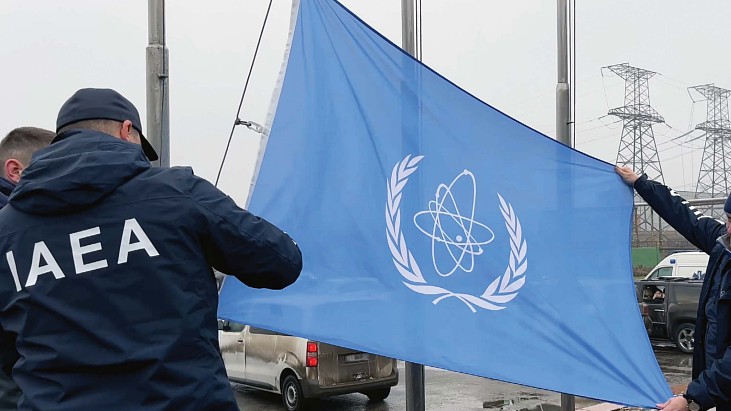IAEA to continue Zaporizhzhia safety zone efforts as war enters second year
24 February 2023
International Atomic Energy Agency (IAEA) director general Rafael Mariano Grossi said the agency will do all it can to ensure nuclear safety, as it publishes a report covering the events of the past year.
 The IAEA has teams present at all Ukraine's nuclear power plants (Image: IAEA)
The IAEA has teams present at all Ukraine's nuclear power plants (Image: IAEA)
The 50-plus page report, Nuclear Safety, Security and Safeguards in Ukraine, details the events since Russian military action began on 24 February 2022, focusing on the impact on the nuclear energy sector in the country and the efforts of the IAEA to minimise the risks of damage to nuclear facilities as a result of the conflict.
In his foreword, Grossi summarises the key events of the past year which has seen "several" of Ukraine’s five nuclear power plants and other facilities come under direct shelling: "Every single one of the IAEA's crucial seven indispensable pillars for ensuring nuclear safety and security in an armed conflict has been compromised, including the physical integrity of nuclear facilities; the operation of safety and security systems; the working conditions of staff; supply chains, communication channels, radiation monitoring and emergency arrangements; and the crucial off-site power supply.
"Two of Ukraine's nuclear power plants came under Russian control. The Chernobyl nuclear power plant and its Exclusion Zone - the site of the 1986 nuclear accident - were under Russian control for five weeks between 24 February and 31 March 2022. Zaporizhzhia NPP, which Russian troops entered on 4 March 2022, remains under Russian control."
He lists the assistance provided by the IAEA in "doing the important work of reducing the likelihood of a nuclear accident or incident in close cooperation with - and at the request of - the Ukrainian authorities".
Grossi adds: "The nuclear safety and security situation at the Zaporizhzhia NPP continues to be fragile and potentially dangerous. We are fortunate that a nuclear accident has not yet come to pass, and we must do everything in our power to minimise the chance that it does. Since returning from my first mission to the Zaporizhzhia NPP in September 2022, I have been urging all parties to swiftly implement a nuclear safety and security protection zone to reduce the risk of a nuclear accident at the Zaporizhzhia NPP. This proposal has found wide international support, and I continue my efforts in working with all parties to agree on the implementation of this vital precautionary measure."
Although both sides are agreed on the principle of there being a safety and security zone at and around the nuclear plant, the months of discussions have yet to conclude an agreement on all the precise details of how it will work at Europe's largest nuclear power plant, which is located on the current frontline of Russian and Ukraine forces.
Grossi says: "As this tragic war enters its second year, I want to reassure the people of Ukraine and the international community that they can count on the IAEA, and me as its Director General, to do everything possible within our remit to assist them and to avert the danger of a nuclear accident that could cause even more suffering where there is already far too much."
In its conclusion, the report says: "The current situation in Ukraine is unprecedented and continues to be dangerous ... it is thanks to the extraordinary efforts of Ukrainian operating staff ... that all nuclear sites have continued to operate safely and securely to date. The resilience and dedication they have shown by continuing to perform their crucial work to the best of their abilities under difficult and stressful conditions affecting their health and well-being is to be commended."
It concludes with the message that "the current situation is untenable and the best action that can be taken to ensure the safety and security of Ukraine’s nuclear facilities is an end to the armed conflict. The IAEA remains committed to provide any support it can to help ensure the safe and secure operation of nuclear facilities and activities using radioactive sources in Ukraine both during the armed conflict and long after it ceases. The continued commitment and close cooperation of Member States with the IAEA is essential".
Researched and written by World Nuclear News